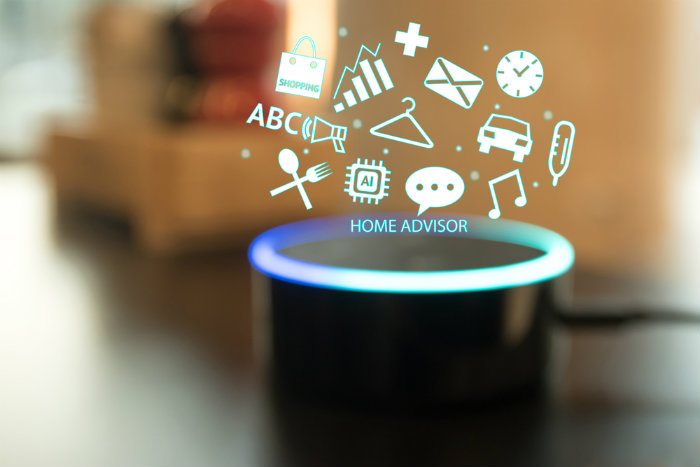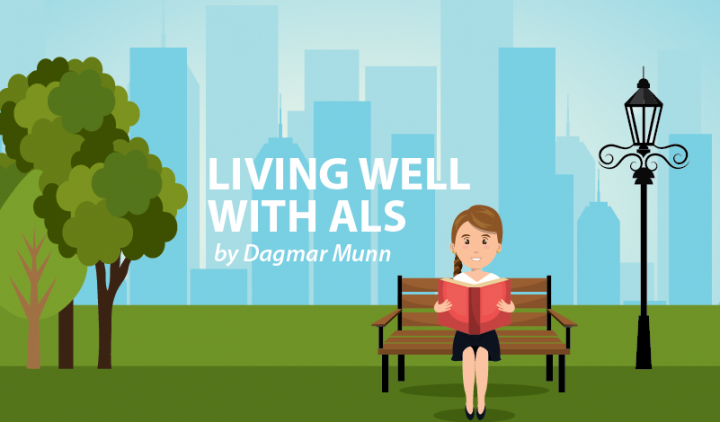Schoolin’ Google in ALS

Do you speak with an “ALS accent”?
I know I do.
Fortunately, my family and close friends have learned to translate my slow, slurred words into meaningful conversation. However, to the Alexa device that lives in our back bedroom and the Echo Show that sits near me, my ALS accent is totally unrecognizable. My verbal requests are always misconstrued or met with stony silence.
But I have good news! Google is collecting voice recordings from people with impaired speech like mine to improve how computers and AI devices respond. Here’s a quick link to check it out, but do read on for more of the story.
What is an ALS accent?
What I call an ALS accent is officially known as dysarthria, and it occurs in 80 percent of all ALS patients.
It’s something I’ve been struggling with for the past three years. And like most other ALS patients with this symptom, I was told by my medical team that eventually I would lose the ability to speak. From that point on, assistive technology would speak for me.
But I didn’t want to give up so easily. As I wrote in my column, “Learning How to Speak (and Breathe) with Ease,” I used Andrea Caban’s innovative techniques to help save what little voice I had.
I’ve since found success applying Caban’s techniques to my everyday conversations with others, but I sure met my match with voice-activated devices. You’d think that a device that responded to random voices emanating from a TV in another room would show respect to my voice being only 2 feet away! But no amount of repetition, variation in tone, or cajoling on my part would trigger the darn thing to wake up!
So, I rely on a simple yet humorous workaround. Using the Text to Speech app on my cellphone, I direct one automated voice to “speak” to another.
Naturally, I jumped at the opportunity to give Google a little schoolin’ in ALS!
The Google speech recognition project
The project is a collaborative effort with the ALS Therapy Development Institute (ALSTDI). As a participant in ALSTDI’s Precision Medicine Program, I was invited to join Google’s project.
Google engineers are collecting voice recordings for something called machine learning. Engineers already use this method for developing speech translation apps that help travelers translate one language into another.
The great thing about machine learning is that the software is constantly maintaining its accuracy. So, when placed in a device, it continues to learn and respond, even as the ALS patient’s speech gets harder to understand.
All I use is my laptop computer — no special equipment is necessary. After signing in to the program, I click an icon on the screen and read aloud the random sentences that pop up. I go at my own pace and usually read about 30 sentences at a time. As a side benefit, I believe that reading out loud is helping me practice good speech habits.
That’s all there is to it!
If you’d like to participate, find out more here.
Let’s help technology learn more about ALS so that we can live well while living with ALS.
***
Note: ALS News Today is strictly a news and information website about the disease. It does not provide medical advice, diagnosis, or treatment. This content is not intended to be a substitute for professional medical advice, diagnosis, or treatment. Always seek the advice of your physician or other qualified health provider with any questions you may have regarding a medical condition. Never disregard professional medical advice or delay in seeking it because of something you have read on this website. The opinions expressed in this column are not those of ALS News Today or its parent company, Bionews Services, and are intended to spark discussion about issues pertaining to ALS.








David Buschhorn
I use a text-to-speech app on my phone and it works great when I'm on the go (correct spelling is important because it'll read whatever you write ;-)). Although it has an ALMOST unisex voice, if I turn my phone vertically, it's more feminine but either way, it's an Indian accent. So I sound like I'm a high-end cab-driver.
I wish I could delete the Google microphone icon on my phone's keyboard. It's almost comically insulting when I accidentally tap that and the whole page goes blank only to be replaced with a line saying, "Try saying something out loud."
Yeah, I haven't been able to make sounds for almost a year :-) I can walk and drive and whatnot just fine since mine almost only affects my bulbar areas (whee!).
Read Aloud is a great (free) program for my laptop and I'll switch my Tobii over to that as well. Whichever one I picked for that device is terrible (it also cost $70). It's easy to use, but doesn't know a lot of simple words and there's no way to teach it.
I used to have a one-disc (1.44 megabyte) text reader, when I was in college in the early 90s. If it didn't correctly pronounce a word you could teach it how to say it by telling it, "Sounds like melon" or whatever. Simple, effective and easy-to-use... Windows 3.1 based though so... gone forever.
My main beef with it is that Read Aloud randomly picks the pronunciation of the word read. Read or "red" is just totally at random. So I type red if I want the past tense and reed if I want present or future. It's annoying. I'm a writer and misspelling and "text-language" grinds my gears :-(
"How RU?" is the sand in the bathing suit of a writer. :-)
Dagmar Munn
Thank you David for sharing your tips and resources! Finally, software engineers are utilizing our (ALS patient's) feedback rather than relying on what they think we need. Someday AI will be responsive to all patient's needs - - and someday there will be a cure for ALS! Keep the positive attitude David... and keep writing :-)
David Buschhorn
Thank you Dagmar! I really love this site :-) It's great to see summaries of people's work, little life hacks (I use needle nose plies for a LOT of things), etc.."
Sometimes I wonder why someone DID such a study, but with others I'm excited to see what happens.
Of course we all fantasize about the, "One pill at the pharmacy and your nerves start growing back" kind of treatment ;-) Maybe someday...
Lisa Bonahoom
Hello Dagmar and David! Thank you both for sharing. I love your posts, Dagmar. I have Bulbar Onset ALS and took part in the Google voice project. I am so hopeful that it will help. Not even Siri understands me. I laugh when my friend, with a heavy Vietnamese accent has conversations with Siri, yet it is a hilarious disaster when I try. Still, I feel so fortunate that with this disease I can still dance (Jazz and Tap) and walk by the Bay. My home is a mass of stairs and I can still use them. My heart aches for those who lose the use of their limbs. I don't see how I could deal with it. I know, if it comes to it, I will deal. I hope I am strong enough. For now, I find joy in the room with music and a mirror!
Ma. Teresa J. Santos
Hi, i was diagnosed with Als bulbar may of 2019 but my symptoms started in may of 2018. I can still walk and drive but recently my right arm started to weaken. Btw, im from the Philippines where riluzole is not available (am purchasing the UK generic riluzole via canada pharmacy online). Am also taking supplements (curcumin, coconut virgin oil, protandim, among others). I’ve been following up your column as well as Ms Neva and Mr Ricks. Just sharing. Tess Santos
Dagmar Munn
Thank you Tess :-) I am honored to know you are a loyal reader of our columns. Let's hope this New Year of 2020 will be the one with the most progress towards finding a cure for ALS.